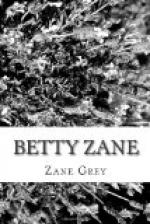Isaac’s head ached and throbbed so that after he had satisfied his thirst and hunger he was glad to close his eyes and lean back against the tree. Engrossed in thoughts of the home he might never see again, he had lain there an hour without moving, when he was aroused from his meditations by low guttural exclamations from the Indians. Opening his eyes he saw Crow and another Indian enter the glade, leading and half supporting a third savage.
They helped this Indian to the log, where he sat down slowly and wearily, holding one hand over his breast. He was a magnificent specimen of Indian manhood, almost a giant in stature, with broad shoulders in proportion to his height. His head-dress and the gold rings which encircled his bare muscular arms indicated that he was a chief high in power. The seven eagle plumes in his scalp-lock represented seven warriors that he had killed in battle. Little sticks of wood plaited in his coal black hair and painted different colors showed to an Indian eye how many times this chief had been wounded by bullet, knife, or tomahawk.
His face was calm. If he suffered he allowed no sign of it to escape him. He gazed thoughtfully into the fire, slowly the while untying the belt which contained his knife and tomahawk. The weapons were raised and held before him, one in each hand, and then waved on high. The action was repeated three times. Then slowly and reluctantly the Indian lowered them as if he knew their work on earth was done.
It was growing dark and the bright blaze from the camp fire lighted up the glade, thus enabling Isaac to see the drooping figure on the log, and in the background Crow, holding a whispered consultation with the other Indians. Isaac heard enough of the colloquy to guess the facts. The chief had been desperately rounded; the palefaces were on their trail, and a march must be commenced at once.
Isaac knew the wounded chief. He was the Delaware Son-of-Wingenund. He married a Wyandot squaw, had spent much of his time in the Wyandot village and on warring expeditions which the two friendly nations made on other tribes. Isaac had hunted with him, slept under the same blanket with him, and had grown to like him.
As Isaac moved slightly in his position the chief saw him. He straightened up, threw back the hunting shirt and pointed to a small hole in his broad breast. A slender stream of blood issued from the wound and flowed down his chest.
“Wind-of-Death is a great white chief. His gun is always loaded,” he said calmly, and a look of pride gleamed across his dark face, as though he gloried in the wound made by such a warrior.
“Deathwind” was one of the many names given to Wetzel by the savages, and a thrill of hope shot through Isaac’s heart when he saw the Indians feared Wetzel was on their track. This hope was short lived, however, for when he considered the probabilities of the thing he knew that pursuit would only result in his death before the settlers could come up with the Indians, and he concluded that Wetzel, familiar with every trick of the redmen, would be the first to think of the hopelessness of rescuing him and so would not attempt it.




